人教版新目标九年级Unit 7 Teenagers should be allowed to choose their own clothes. Section B reading课件(30张PPT)
文档属性
| 名称 | 人教版新目标九年级Unit 7 Teenagers should be allowed to choose their own clothes. Section B reading课件(30张PPT) | 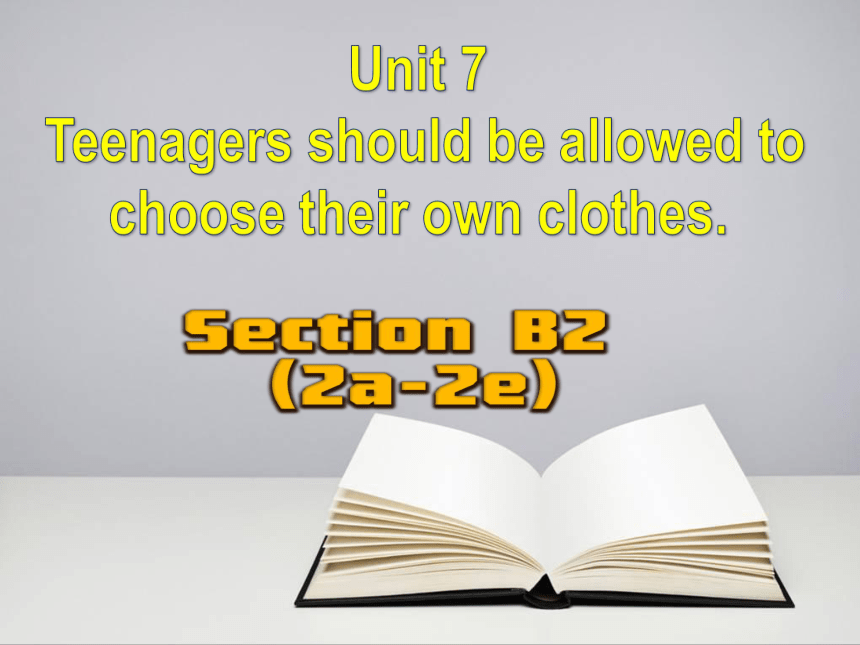 | |
| 格式 | pptx | ||
| 文件大小 | 2.2MB | ||
| 资源类型 | 教案 | ||
| 版本资源 | 人教新目标(Go for it)版 | ||
| 科目 | 英语 | ||
| 更新时间 | 2020-12-02 15:22:14 | ||
图片预览

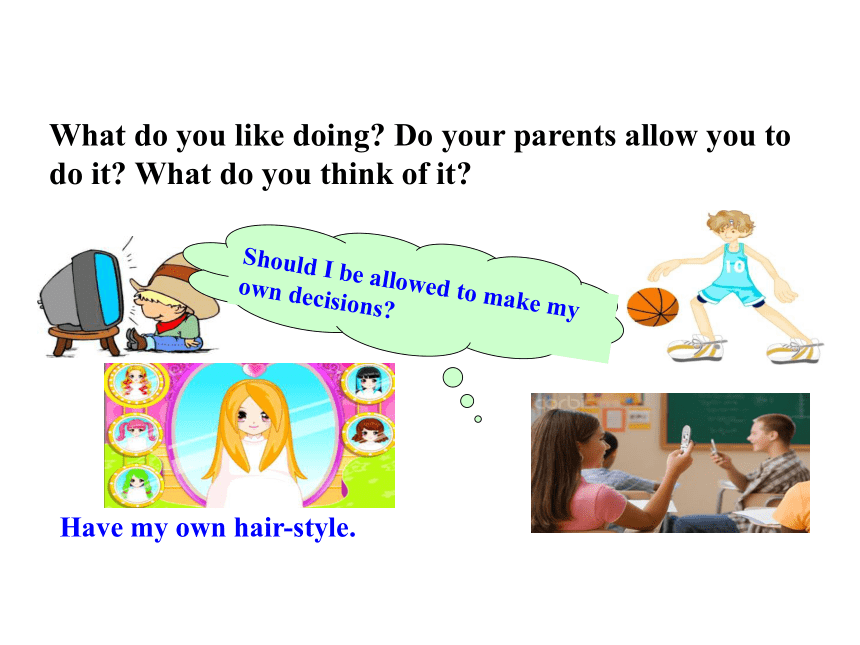
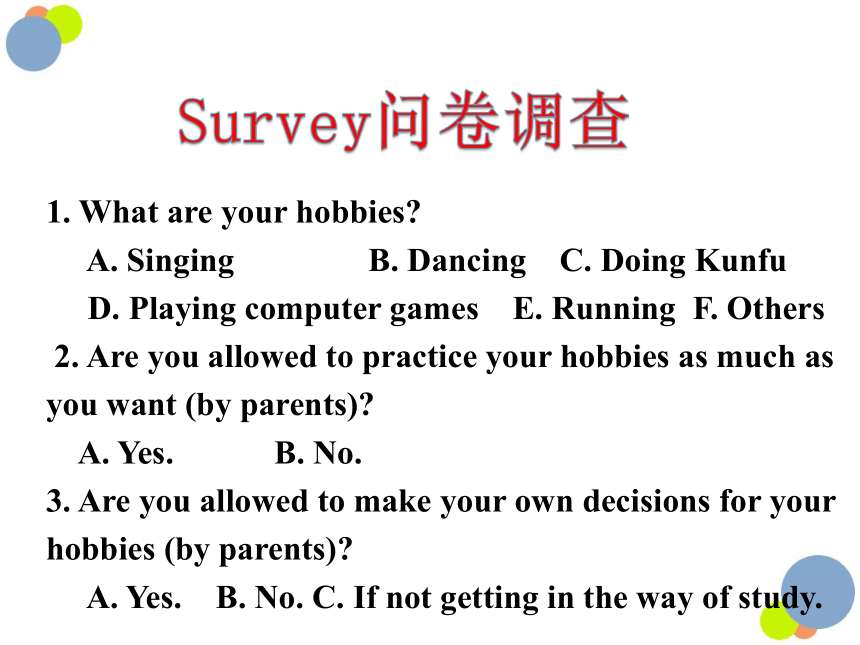

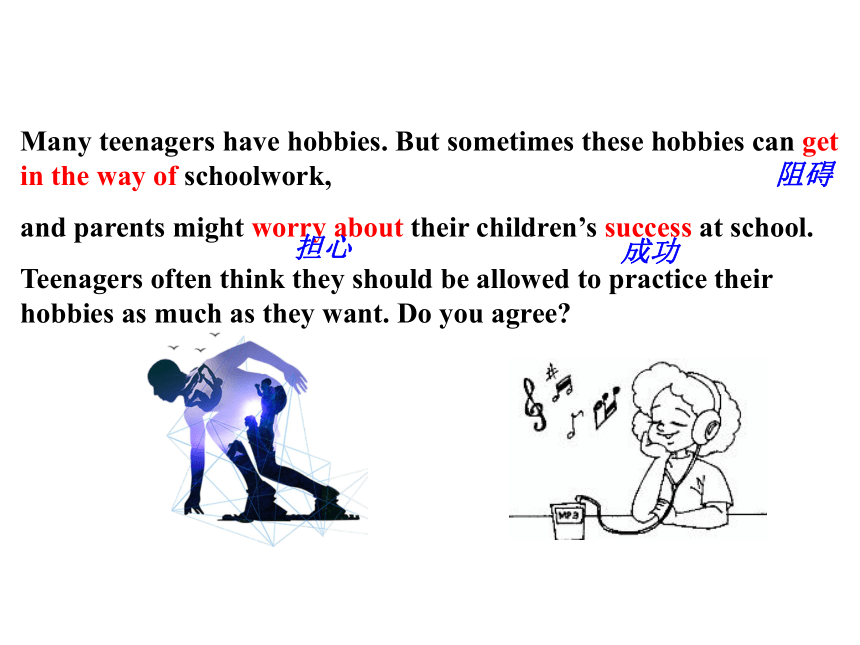
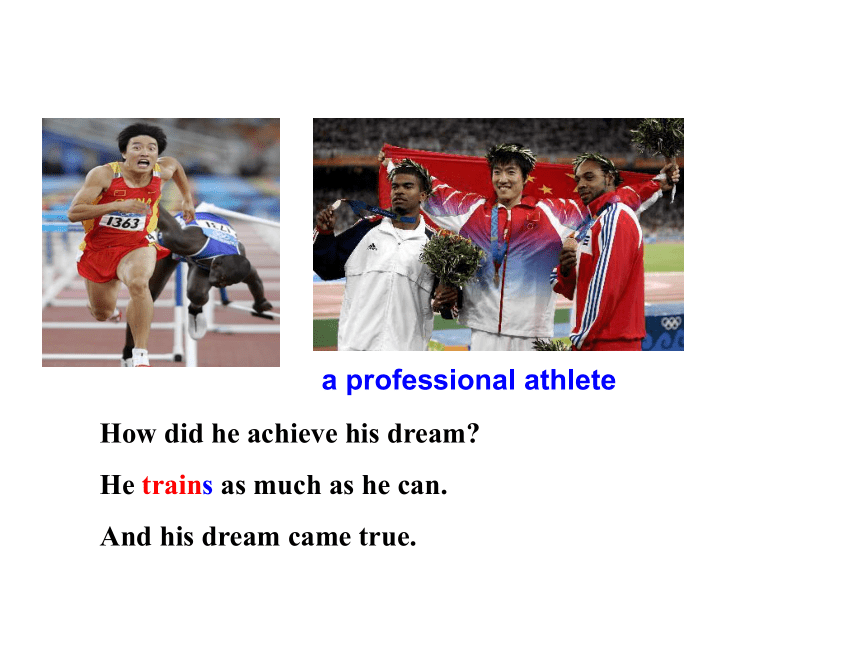
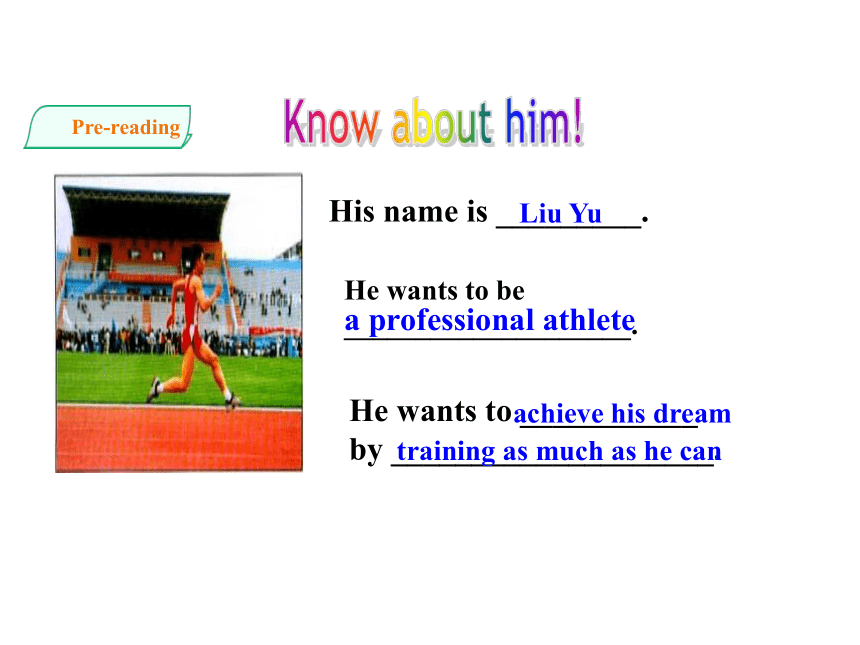
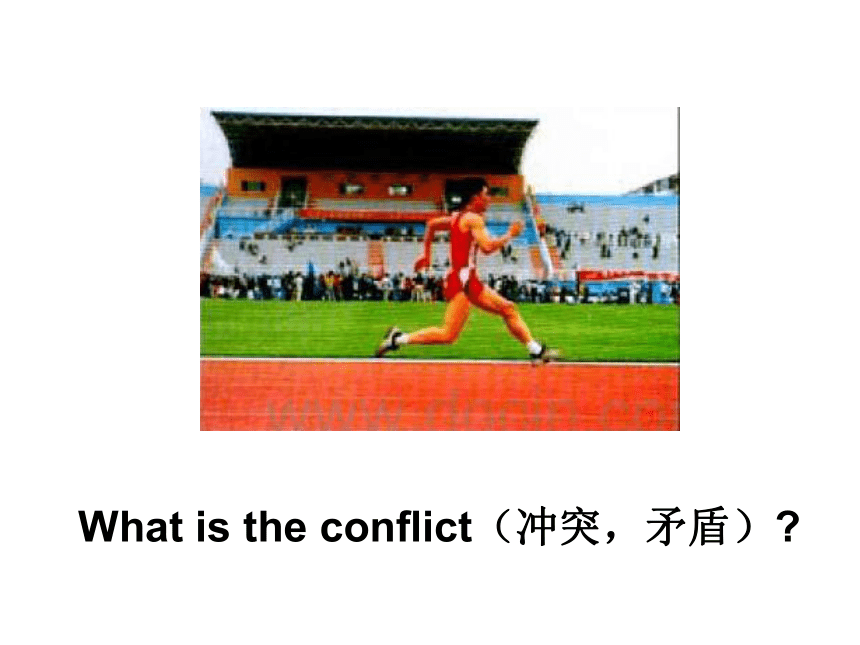
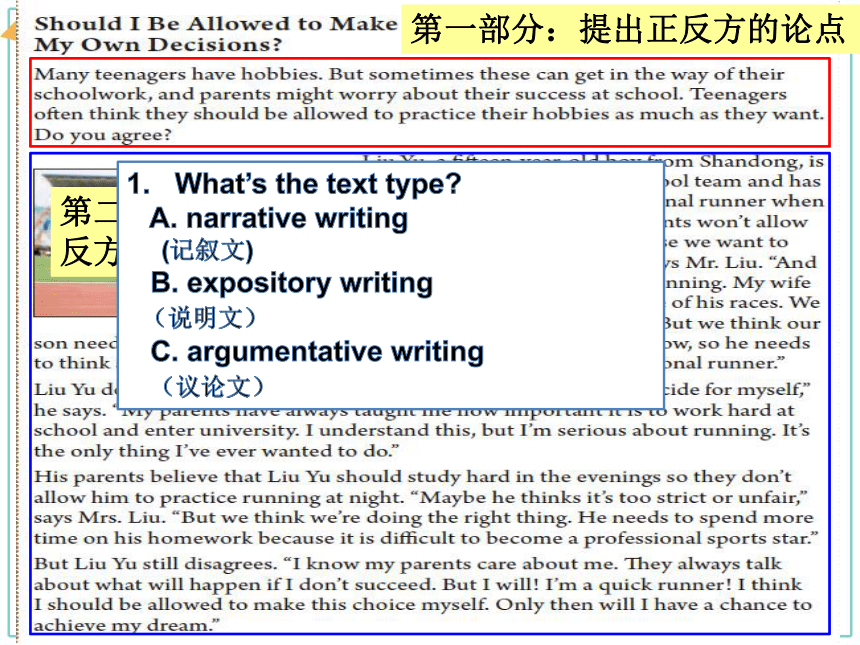
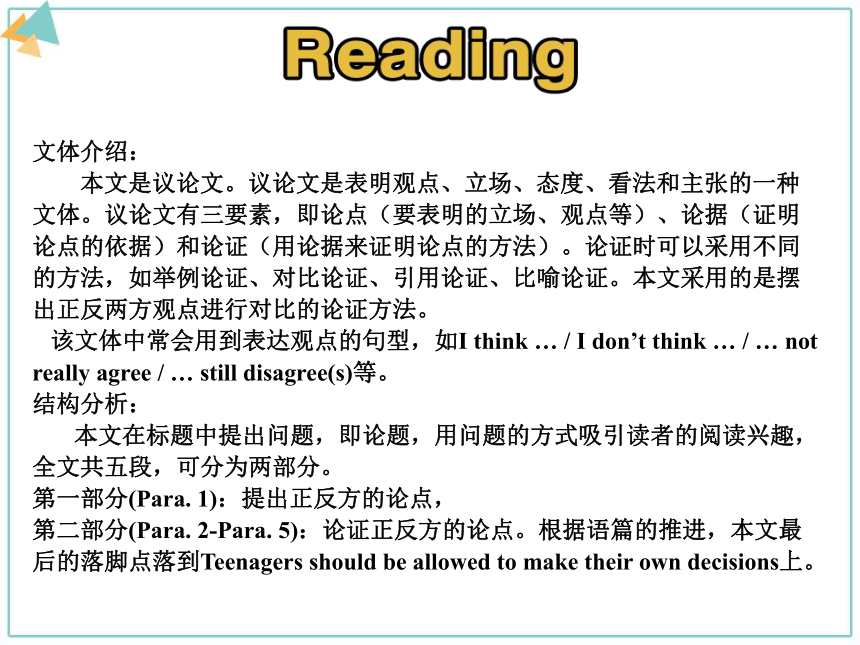
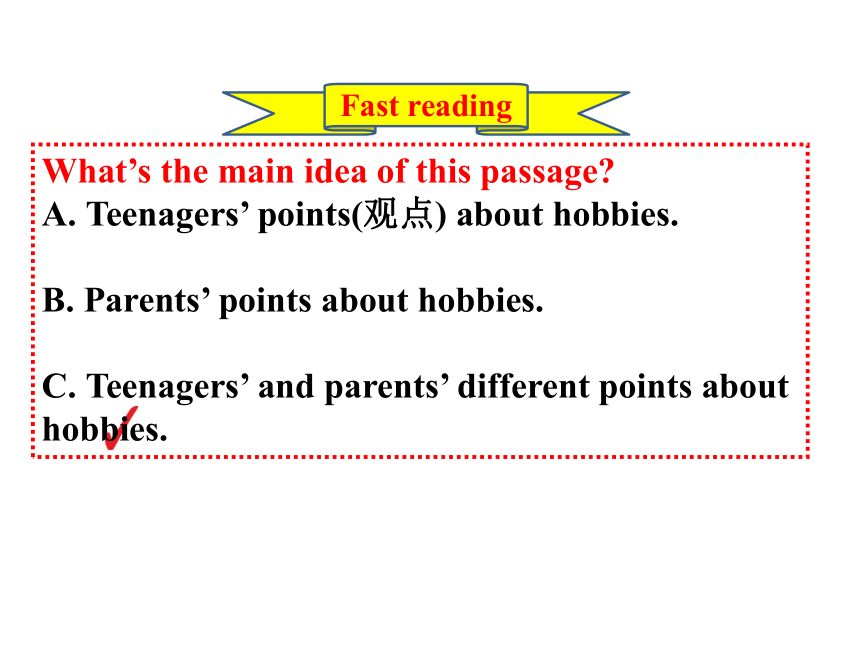
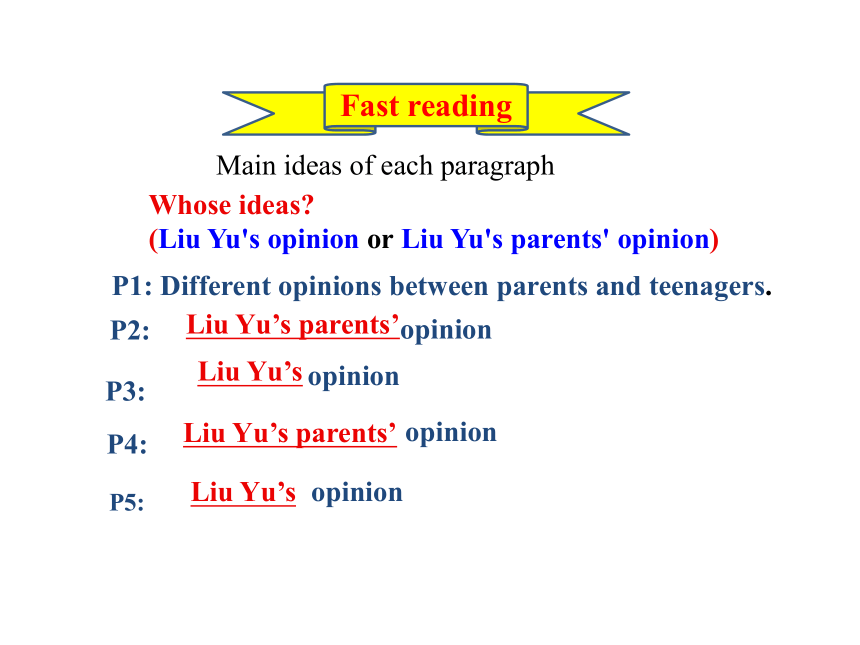
文档简介
Unit 7
Teenagers should be allowed to choose their own clothes.
Have my own hair-style.
What do you like doing? Do your parents allow you to do it? What do you think of it?
Should I be allowed to make my own decisions?
1. What are your hobbies?
A. Singing B. Dancing C. Doing Kunfu
D. Playing computer games E. Running F. Others
2. Are you allowed to practice your hobbies as much as you want (by parents)?
A. Yes. B. No.
3. Are you allowed to make your own decisions for your hobbies (by parents)?
A. Yes. B. No. C. If not getting in the way of study.
Survey问卷调查
Do you think hobby can get in the way of schoolwork?
Think about it
妨碍;挡……的路
Many teenagers have hobbies. But sometimes these hobbies can get in the way of schoolwork,
and parents might worry about their children’s success at school.
Teenagers often think they should be allowed to practice their hobbies as much as they want. Do you agree?
阻碍
担心
成功
a professional athlete
How did he achieve his dream?
He trains as much as he can.
And his dream came true.
He wants to ___________
by ____________________.
He wants to be ____________________.
His name is _________.
a professional athlete
training as much as he can
Liu Yu
achieve his dream
Know about him!
Pre-reading
Conflict: Liu Yu wants to be a professional runner, but his parents don’t allow him to train as much as he wants.
What is the conflict(冲突,矛盾)?
第一部分:提出正反方的论点
第二部分:论证正反方的论点
What’s the text type?
A. narrative writing
(记叙文)
B. expository writing
(说明文)
C. argumentative writing
(议论文)
文体介绍:
本文是议论文。议论文是表明观点、立场、态度、看法和主张的一种文体。议论文有三要素,即论点(要表明的立场、观点等)、论据(证明论点的依据)和论证(用论据来证明论点的方法)。论证时可以采用不同的方法,如举例论证、对比论证、引用论证、比喻论证。本文采用的是摆出正反两方观点进行对比的论证方法。
该文体中常会用到表达观点的句型,如I think?…?/ I don’t think?…?/?…?not really agree /?…?still disagree(s)等。
结构分析:
???????本文在标题中提出问题,即论题,用问题的方式吸引读者的阅读兴趣,全文共五段,可分为两部分。
第一部分(Para. 1):提出正反方的论点,
第二部分(Para. 2-Para. 5):论证正反方的论点。根据语篇的推进,本文最后的落脚点落到Teenagers should be allowed to make their own decisions上。
What’s the main idea of this passage?
A. Teenagers’ points(观点) about hobbies.
B. Parents’ points about hobbies.
C. Teenagers’ and parents’ different points about hobbies.
Fast reading
Main ideas of each paragraph
Whose ideas?
(Liu Yu's opinion or Liu Yu's parents' opinion)
P1: Different opinions between parents and teenagers.
P2:
opinion
P3:
opinion
P4:
opinion
P5:
opinion
Liu Yu’s parents’
Liu Yu’s
Liu Yu’s parents’
Liu Yu’s
Fast reading
Name
Liu Yu
Age
From
Now
Dream
Problem
15 years old
Shandong
on his school running team
be a professional runner
His parents won’t allow him to train as much as he would like to.
Read the passage and complete the form.
1. Sometimes our hobbies can get in the way of schoolwork. ( )
2. Liu Yu’s parents allow him to train as much as he would like to. ( )
3. His parents have taught him to do what he enjoys instead of working hard at school. ( )
T
F
F
won’t allow him to train as much
won’t teach
4. Liu Yu is serious about running in order to (为了) achieve his dream. ( )
5. His parents think he needs to spend more time on his homework. ( )
6. Liu Yu thinks he will succeed if his parents allow him to make this decision for himself. ( )
T
T
T
Liu’s opinion: I should be allowed to
_____________________.
Reasons:
I’m a running ______ on the school team.
2. I’m ______________ running. It’s the _____ thing I’ve ever wanted to do.
3. I understand the __________ of working hard and entering university, and I know my parents are _______________ what will happen if I don’t _________, but I ________ (succeed) because I’m a _______ runner!
Conclusion: I should be allowed to make this _________ myself. _________ will I have a chance to _________ my dream.
decide for myself
star
serious about
only
importance
worried about
succeed
will
quick
choice/decision
Only then
achieve
Parents’ opinion: Liu should be __________ and work hard at school.
Reasons:
1. It’s ________ to become a _________ sports star.
2. He needs to think about what will happen if he doesn’t _____________ a professional runner. He needs to think about other _________ jobs.
3. He needs to _________ more time ___ his schoolwork and study hard in the evenings.
Conclusion: He should spend more time on his ________ and not _______ too much.
realistic
difficult
professional
end up as
possible
spend
on
schoolwork
train
Write a letter to Liu to offer your advice.
Dear Liu Yu,
…
Your sincere friend,
_______
… do/does have a point but I agree/disagree with …
As far as I’m concerned, Liu should …
First of all,, …
Besides, …
Last but not least …
Voice your opinion: My advice
In a word, …
Do Liu’s parents care about him?
They know __________ he loves running.
They want to see him ______________.
They have _____________ running.
They have _______ _________ of his races.
how much
achieve his dreams
nothing against
supported
every one
Are Liu’s parents too strict with him?
Is it unfair for them to stop Liu from training as much as he wants?
Voice your opinion!
Parents know best and they only want the best for us!
Love-parents Union!
success
spend
choose
chance
get
believe
other
serious
profession
achieve
Liu Yu is a 15-year-old boy. He wants to be a _________ runner. He is _______ about running. But his parents always worry about his _______ at school. They think running will ____ in the way of his study. They think he should think about _____ possible jobs. They think he should ______ more time on his homework. They think his dream is hard to ________.
But Liu Yu disagrees . He think he should be allowed to make the ________ himself. He _________ himself. Only then will he have a _______ to realize his dream.
professional
serious
success
get
other
spend
achieve
choice
believes
chance
挡……的路;妨碍……
职业跑步运动员
成长;长大;成熟
实现他的梦想
支持他的每一次比赛
不反对某事
考虑其他可能的工作
最终成为……
我自己做决定
上大学
严肃?/?认真对待……
在他的家庭作业上多花点时间
关心;在意
有机会做某事
Language points
1. But sometimes these can get in the way of their schoolwork …
get in the way of 挡……的路;妨碍
e.g. Computer games will get in the way of his study.
电脑游戏会影响他的学习。
2. My wife and I have supported every one of his races.
我妻子和我也曾经支持他的每一次比赛。
support vt. 支持
support sb. with sth. 用某物支持某人
3. …but I’m serious about running.
但是对于跑步我也是很严肃对待的。
be serious about 对……是认真的
4. My parents have always taught me how important it is to work hard at school and enter university.
我父母总是教导我在学校努力学习,上大学是多么重要。 1) 本句为主从复合句。宾语从句中含有how引导的感叹句。感叹句中it为形式主语,其真正的主语是“to work hard at
school and enter university”
2) enter v. 进来;进去
e.g. Please do not enter before knocking
on the door.
进来前请先敲门。
He has no choice but enter that college.
除了进那所大学读书他别无选择。
[拓展]
enter 作为动词还可意为“参加”。
e.g. We entered the contest.
我们参加了比赛。
5. I think I should be allowed to make this choice myself.
我觉得应该允许我自己做决定。
choice可数名词,意为“选择;挑选”,其动词形式为choose。
make a choice 做出选择
e.g. 当你做选择时你受了什么影响?
______________________________
______________________________
What influenced you when you made your choice?
6. Only then will I have a chance to achieve my dream.
1) 这是一个倒装句,正常语序是I will have a chance to achieve my dream only then. 但由于与前文的连贯性及强调的需要,only then被置于句首。
英文的句子大多主语在前,谓语在后。但在一些句子中,由于修辞或句子结构上的需要,谓语被部分或完全置于主语之前,构成“倒装语序”。
only用于句子的开头,后接副词、介词短语或状语从句时,句子应倒装。例如:
______ yesterday _________ find out that his watch was lost.
直到昨天他才发现他的手表丢了。
______ after a year _______ begin to see the results of my work.
直到一年后,我才开始看到我工作的成果。
Only
did he
Only
did I
2) achieve one’s dream 实现梦想
表达梦想的“实现”,除动词achieve外,英语常用fulfill和realize; 如果用于dream之后,还有come true。
e.g. My dream will come true .
1. Read the passage again.
2. Find some information of a famous person and write an article about how he/ she became successful.
Teenagers should be allowed to choose their own clothes.
Have my own hair-style.
What do you like doing? Do your parents allow you to do it? What do you think of it?
Should I be allowed to make my own decisions?
1. What are your hobbies?
A. Singing B. Dancing C. Doing Kunfu
D. Playing computer games E. Running F. Others
2. Are you allowed to practice your hobbies as much as you want (by parents)?
A. Yes. B. No.
3. Are you allowed to make your own decisions for your hobbies (by parents)?
A. Yes. B. No. C. If not getting in the way of study.
Survey问卷调查
Do you think hobby can get in the way of schoolwork?
Think about it
妨碍;挡……的路
Many teenagers have hobbies. But sometimes these hobbies can get in the way of schoolwork,
and parents might worry about their children’s success at school.
Teenagers often think they should be allowed to practice their hobbies as much as they want. Do you agree?
阻碍
担心
成功
a professional athlete
How did he achieve his dream?
He trains as much as he can.
And his dream came true.
He wants to ___________
by ____________________.
He wants to be ____________________.
His name is _________.
a professional athlete
training as much as he can
Liu Yu
achieve his dream
Know about him!
Pre-reading
Conflict: Liu Yu wants to be a professional runner, but his parents don’t allow him to train as much as he wants.
What is the conflict(冲突,矛盾)?
第一部分:提出正反方的论点
第二部分:论证正反方的论点
What’s the text type?
A. narrative writing
(记叙文)
B. expository writing
(说明文)
C. argumentative writing
(议论文)
文体介绍:
本文是议论文。议论文是表明观点、立场、态度、看法和主张的一种文体。议论文有三要素,即论点(要表明的立场、观点等)、论据(证明论点的依据)和论证(用论据来证明论点的方法)。论证时可以采用不同的方法,如举例论证、对比论证、引用论证、比喻论证。本文采用的是摆出正反两方观点进行对比的论证方法。
该文体中常会用到表达观点的句型,如I think?…?/ I don’t think?…?/?…?not really agree /?…?still disagree(s)等。
结构分析:
???????本文在标题中提出问题,即论题,用问题的方式吸引读者的阅读兴趣,全文共五段,可分为两部分。
第一部分(Para. 1):提出正反方的论点,
第二部分(Para. 2-Para. 5):论证正反方的论点。根据语篇的推进,本文最后的落脚点落到Teenagers should be allowed to make their own decisions上。
What’s the main idea of this passage?
A. Teenagers’ points(观点) about hobbies.
B. Parents’ points about hobbies.
C. Teenagers’ and parents’ different points about hobbies.
Fast reading
Main ideas of each paragraph
Whose ideas?
(Liu Yu's opinion or Liu Yu's parents' opinion)
P1: Different opinions between parents and teenagers.
P2:
opinion
P3:
opinion
P4:
opinion
P5:
opinion
Liu Yu’s parents’
Liu Yu’s
Liu Yu’s parents’
Liu Yu’s
Fast reading
Name
Liu Yu
Age
From
Now
Dream
Problem
15 years old
Shandong
on his school running team
be a professional runner
His parents won’t allow him to train as much as he would like to.
Read the passage and complete the form.
1. Sometimes our hobbies can get in the way of schoolwork. ( )
2. Liu Yu’s parents allow him to train as much as he would like to. ( )
3. His parents have taught him to do what he enjoys instead of working hard at school. ( )
T
F
F
won’t allow him to train as much
won’t teach
4. Liu Yu is serious about running in order to (为了) achieve his dream. ( )
5. His parents think he needs to spend more time on his homework. ( )
6. Liu Yu thinks he will succeed if his parents allow him to make this decision for himself. ( )
T
T
T
Liu’s opinion: I should be allowed to
_____________________.
Reasons:
I’m a running ______ on the school team.
2. I’m ______________ running. It’s the _____ thing I’ve ever wanted to do.
3. I understand the __________ of working hard and entering university, and I know my parents are _______________ what will happen if I don’t _________, but I ________ (succeed) because I’m a _______ runner!
Conclusion: I should be allowed to make this _________ myself. _________ will I have a chance to _________ my dream.
decide for myself
star
serious about
only
importance
worried about
succeed
will
quick
choice/decision
Only then
achieve
Parents’ opinion: Liu should be __________ and work hard at school.
Reasons:
1. It’s ________ to become a _________ sports star.
2. He needs to think about what will happen if he doesn’t _____________ a professional runner. He needs to think about other _________ jobs.
3. He needs to _________ more time ___ his schoolwork and study hard in the evenings.
Conclusion: He should spend more time on his ________ and not _______ too much.
realistic
difficult
professional
end up as
possible
spend
on
schoolwork
train
Write a letter to Liu to offer your advice.
Dear Liu Yu,
…
Your sincere friend,
_______
… do/does have a point but I agree/disagree with …
As far as I’m concerned, Liu should …
First of all,, …
Besides, …
Last but not least …
Voice your opinion: My advice
In a word, …
Do Liu’s parents care about him?
They know __________ he loves running.
They want to see him ______________.
They have _____________ running.
They have _______ _________ of his races.
how much
achieve his dreams
nothing against
supported
every one
Are Liu’s parents too strict with him?
Is it unfair for them to stop Liu from training as much as he wants?
Voice your opinion!
Parents know best and they only want the best for us!
Love-parents Union!
success
spend
choose
chance
get
believe
other
serious
profession
achieve
Liu Yu is a 15-year-old boy. He wants to be a _________ runner. He is _______ about running. But his parents always worry about his _______ at school. They think running will ____ in the way of his study. They think he should think about _____ possible jobs. They think he should ______ more time on his homework. They think his dream is hard to ________.
But Liu Yu disagrees . He think he should be allowed to make the ________ himself. He _________ himself. Only then will he have a _______ to realize his dream.
professional
serious
success
get
other
spend
achieve
choice
believes
chance
挡……的路;妨碍……
职业跑步运动员
成长;长大;成熟
实现他的梦想
支持他的每一次比赛
不反对某事
考虑其他可能的工作
最终成为……
我自己做决定
上大学
严肃?/?认真对待……
在他的家庭作业上多花点时间
关心;在意
有机会做某事
Language points
1. But sometimes these can get in the way of their schoolwork …
get in the way of 挡……的路;妨碍
e.g. Computer games will get in the way of his study.
电脑游戏会影响他的学习。
2. My wife and I have supported every one of his races.
我妻子和我也曾经支持他的每一次比赛。
support vt. 支持
support sb. with sth. 用某物支持某人
3. …but I’m serious about running.
但是对于跑步我也是很严肃对待的。
be serious about 对……是认真的
4. My parents have always taught me how important it is to work hard at school and enter university.
我父母总是教导我在学校努力学习,上大学是多么重要。 1) 本句为主从复合句。宾语从句中含有how引导的感叹句。感叹句中it为形式主语,其真正的主语是“to work hard at
school and enter university”
2) enter v. 进来;进去
e.g. Please do not enter before knocking
on the door.
进来前请先敲门。
He has no choice but enter that college.
除了进那所大学读书他别无选择。
[拓展]
enter 作为动词还可意为“参加”。
e.g. We entered the contest.
我们参加了比赛。
5. I think I should be allowed to make this choice myself.
我觉得应该允许我自己做决定。
choice可数名词,意为“选择;挑选”,其动词形式为choose。
make a choice 做出选择
e.g. 当你做选择时你受了什么影响?
______________________________
______________________________
What influenced you when you made your choice?
6. Only then will I have a chance to achieve my dream.
1) 这是一个倒装句,正常语序是I will have a chance to achieve my dream only then. 但由于与前文的连贯性及强调的需要,only then被置于句首。
英文的句子大多主语在前,谓语在后。但在一些句子中,由于修辞或句子结构上的需要,谓语被部分或完全置于主语之前,构成“倒装语序”。
only用于句子的开头,后接副词、介词短语或状语从句时,句子应倒装。例如:
______ yesterday _________ find out that his watch was lost.
直到昨天他才发现他的手表丢了。
______ after a year _______ begin to see the results of my work.
直到一年后,我才开始看到我工作的成果。
Only
did he
Only
did I
2) achieve one’s dream 实现梦想
表达梦想的“实现”,除动词achieve外,英语常用fulfill和realize; 如果用于dream之后,还有come true。
e.g. My dream will come true .
1. Read the passage again.
2. Find some information of a famous person and write an article about how he/ she became successful.
同课章节目录
- Unit 1 How can we become good learners.
- Section A
- Section B
- Unit 2 I think that mooncakes are delicious!
- Section A
- Section B
- Unit 3 Could you please tell me where the restroom
- Section A
- Section B
- Unit 4 I used to be afraid of the dark.
- Section A
- Section B
- Unit 5 What are the shirts made of?
- Section A
- Section B
- Review of Units 1-5
- Unit 6 When was it invented?
- Section A
- Section B
- Unit 7 Teenagers should be allowed to choose their
- Section A
- Section B
- Unit 8 It must belong to Carla.
- Section A
- Section B
- Unit 9 I like music that I can dance to.
- Section A
- Section B
- Unit 10 You're supposed to shake hands.
- Section A
- Section B
- Review of Units 6-10
- Unit 11 Sad movies make me cry.
- Section A
- Section B
- Unit 12 Life is full of the unexpected
- Section A
- Section B
- Unit 13 We're trying to save the earth!
- Section A
- Section B
- Unit 14 I remember meeting all of you in Grade 7.
- Section A
- Section B
- Review of Units 11-14
